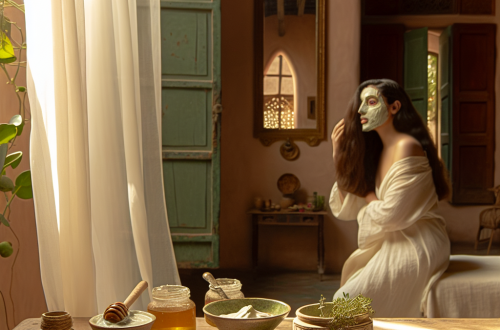Unlocking the Secrets of Hair Growth with Ancient Remedies

The journey to healthier, fuller hair is one that has intrigued humanity for generations. While modern science has its fair share of offerings, sometimes the answers lie in the past or buried in grandma’s old recipe book. Ancient remedies have been whispered from generation to generation, often with a sense of mystery and reverence. What if these age-old secrets hold more power than any bottle on the supermarket shelf?
Ancient Remedies for Modern Hair
It’s funny how the most high-tech solutions sometimes seem to circle back to what our ancestors used. I mean, who’d have thought that fermenting rice water would still be a thing? But here we are, rediscovering the potential of these time-honored practices. In many cultures, hair is not just a collection of dead cells but a symbol of health, vitality, and sometimes even spirituality. From the ancient Egyptians who slathered their locks with castor oil to the Indian subcontinent’s extensive use of amla and hibiscus, there’s a treasure trove of remedies waiting to be explored.
So, what makes these natural treatments so beloved? Part of it could be nostalgia or maybe it’s just the comforting simplicity of using ingredients with names you can actually pronounce. Plus, there’s something oddly satisfying about concocting a potion in your kitchen that might just rival any salon treatment.
The Magic of Oils and Herbs
Let’s talk about oils. For me, it all started with coconut oil, which I initially used more for cooking than anything else. But then a friend mentioned how her grandmother swore by it for hair growth. I gave it a shot and while it didn’t transform my hair overnight, it did leave it feeling softer and noticeably shinier. I even found myself sniffing my own hair like a weirdo because, let’s face it, coconut oil smells like a tropical vacation.
But coconut oil isn’t the only star. Castor oil has been hailed for its ability to boost hair growth. There’s something almost magical about its thick, sticky texture, as if its very consistency promises strength and resilience. Applying it can be a bit of a wrestling match, though. I remember the first time I tried it, I felt like I’d been slimed in a 90s game show. But the results? Totally worth it.
Herbs like rosemary and nettle also come highly recommended. Rosemary, with its fresh, invigorating scent, is said to stimulate blood circulation to the scalp. A study published in the journal “Skinmed” in 2015 even suggested rosemary oil could be as effective as minoxidil, a common hair growth treatment, after six months of use. Who knew?
Household Staples with a Twist
Some household staples have their own unexpected reputations in hair care. Take rice water, for example. It might sound odd, but it’s been a beauty secret among Yao women in China’s Huangluo village their hair averages about six feet long, and they rarely go gray before their eighties. The recipe? Just soak or boil rice and use the water as a rinse. When I tried it, I half-expected my hair to smell like sushi, but it turned out surprisingly fresh and smooth.
Eggs, too, have been touted for their protein content. Whipping up an egg mask can be a bit of a messy affair; there’s a fine line between nourishing your hair and ending up with breakfast in your locks. But the proteins and fats in eggs are believed to strengthen and moisturize, which is good news for anyone battling brittle strands.
And then there’s the humble onion. Admittedly, the idea of rubbing onion juice on my scalp wasn’t exactly appealing. But a 2002 study published in the “Journal of Dermatology” found that onion juice significantly improved hair regrowth for participants with alopecia areata. The smell, however, is a different story let’s just say social distancing wasn’t an issue during my little experiment.
Finding the Balance
While ancient remedies offer a lot of promise, it’s worth remembering that they don’t always work for everyone. Some people might find coconut oil a miracle worker, while others might just end up with greasy locks. It’s all about finding what works for you. And sometimes, mixing a bit of the old with the new can be the perfect combo.
One thing I’ve learned is that patience really is a virtue. Hair grows at its own pace, and expecting instant miracles can lead to disappointment. It’s a bit like planting a garden you nurture it, give it the right conditions, and then sit back and let nature do its thing.
Unexpected Observations and Surprising Insights
Here’s something I didn’t expect: the journey to healthier hair often leads to a healthier lifestyle overall. As I started paying attention to what I was putting on my hair, I became more aware of what I was putting into my body, too. It’s like the domino effect of self-care. Eating a balanced diet rich in vitamins and minerals suddenly made sense not just for my hair, but for my skin, energy levels, and overall well-being.
Another surprising nugget of wisdom? Stress can be a sneaky saboteur. I used to brush off the idea that stress affected my hair, but there’s legitimate science backing this up. Stress can push hair follicles into a resting phase, leading to thinning or shedding. So, finding ways to manage stress, whether through yoga, meditation, or even just binge-watching your favorite series, can be as beneficial as any hair mask.
Wrapping Up the Tangled Tale
In the end, the quest for hair growth is as much about self-discovery as it is about beautiful tresses. Ancient remedies offer a glimpse into the past while still holding relevance today. They remind us that sometimes, the simplest solutions can be the most effective. Whether it’s the soothing ritual of a hot oil massage or the invigorating scent of herbs, these practices connect us to a lineage of beauty and care that transcends time.
So, next time you find yourself in the hair care aisle, maybe you’ll pause and wonder could the answer to your hair woes be sitting in your pantry or growing in your garden? It might just be worth a try. After all, there’s a certain charm in the old ways, and who knows, maybe your great-grandmother was onto something all along.


